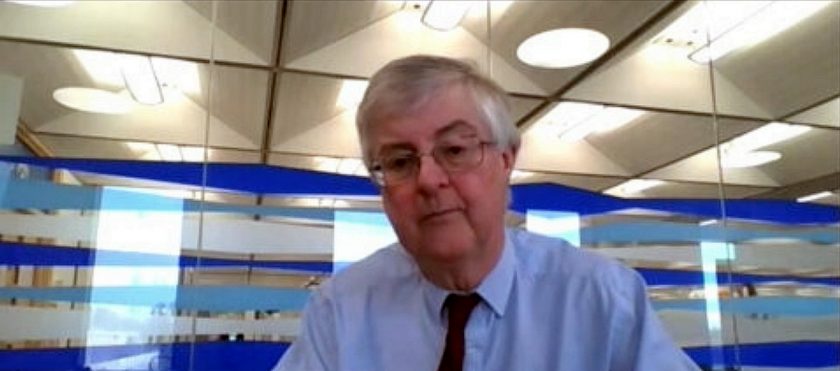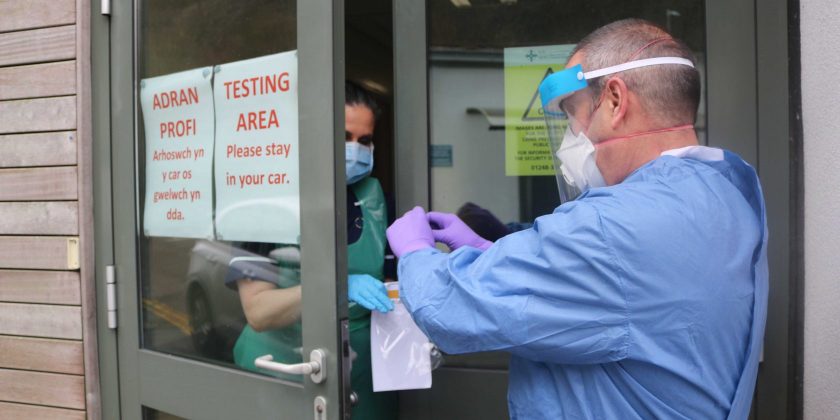First Minister warns in Q&A session: “Nobody should think that because they haven’t got it yet, somehow it isn’t going to hit them”

The First Minister of Wales Mark Drakeford has said he wants to have a conversation with the people of Wales on how the country returns to a new normality as and when restrictions are relaxed, and gave thanks to “the most fantastic support from people over the really difficult things we have asked them to do over the last few weeks”.
Mr Drakeford took direct questions from North Wales media this morning, via remote video that is now becoming the norm for many under lockdown. We asked him several questions, with his answers detailed below.
Previously the First Minister and other Ministers have said now is not the time to be examining previous decisions and to leave that for future inquiries, with a focus on the here and now and future response to the pandemic.
We pointed to previous advice and decisions over the last month or so, and pointed out that the people giving the advice and making decisions now are unchanged. We asked the First Minister about his confidence in them, and what he was doing to challenge them.
Mr Drakeford said: “The system challenges itself all the time, there are four Chief Medical Officers who meet almost every day and that that is what they spend their time doing, challenging the evidence, interrogating the data, looking to see what lessons that can be learned from overseas.
“Now, I entirely understand that lots of this is a contested area where there are people who have strong views about the right way things should be done, how we should go about different aspects of responding to the crisis.
“As a politician, I cannot be in the position where I choose which bits of advice I think we should go on. I think that will be a really dangerous way of proceeding. What I have to do, I’m in exactly the same position as the First Minister of Scotland and Ministers elsewhere in the UK, is we have a system, we have experts who are employed to provide advice to governments, they are independent, they are objective, they are the senior people in their field.
“They test the advice all the time. Of course we ask questions, whenever advice is given to us to make sure we are understanding it, and we think it’s robust. Then we have to rely on it.
“I want people in Wales to know that the decisions that are being made about how their health is protected, are not being made on any sort of political basis. They are being made entirely on the most expert, senior advice, that we can secure. Then we do our best to translate that advice into the most effective practice on the ground.”
Locally we have reported how Wrexham is currently averaging around 16 tests a day. Previously the First Minister indicated Gwent was seen as a hotspot due to more vigorous testing, and last week the public was told testing follows the levels of transmission in the community. We asked if it was chicken and egg situation, and how they were following the levels of community transmission to discover if there needs to be more testing, if there is not much testing taking place.
The First Minister explained that the system was not entirely based or has to rely on that process, “Epidemiologists have very sophisticated models in which they can work back, for example, on the rate of admissions to ITU beds in different parts of Wales. That will tell them the level of community circulation because people in ITU the demand for ITU beds is a product and how much coronavirus is around in the community.
“There are different levels of pressure on ITU beds in different parts of Wales, which is why the scientists are confident in saying to us that there is a pattern in the spread of the disease, it is moving east to west, and it is moving south to north.”
“So in different parts of Wales, it doesn’t just rely on levels of community testing to know how much he’s around, you can, in a formulaic way assess how much is around any part of Wales by looking at the demand there is in other parts of the system, hospital admissions, ITU admissions of people in hospital, which is why we’re confident that Gwent had the first and most significant flare up in coronavirus in Wales.”
He said: “It’s coming everywhere. Nobody should think that because they haven’t got it yet, somehow it isn’t going to hit them.”
“I’m afraid Coronavirus is something that will spread, it is spreading at different paces to different parts of Wales, and North Wales can be deduced from, as I say, hospital admissions, ITU admissions, that tell us how much of it is about in the community.”
We pointed out that the information he was referencing gives the First Minister and others the real picture, however that is not public. We noted that yesterday, his Health Minister said he wanted to be as “transparent as possible” with statistics to underscore what the reality of Coronavirus says is. We asked if death rates, ITU capacities and recovery rates as are public in other countries should be public domain in Wales.
The First Minister replied: “We are keen to put as much into the public domain as we can. There’s always a concern in some points of the data if the numbers are small in any particular area that you could lead to the identification of individuals, and the distress that that might cause to them and families and so on.
“Where we can aggregate data to a level where the risk of individual identification is mitigated, then we are very keen to put data into the public domain.
“Where there are suggestions that we could do more of that, or could do it in way that would be more helpful to people to understand what is happening in the localities, we are very happy to hear those suggestions and see if we can act on them.”
We pointed to our story last night where we had been told testing criteria was too tight for some local authorities to submit names for testing, which itself came in response to the Health Minister stating his frustration that testing slots were not full up.
We noted that having symptoms being a requirement for a test seemed at odds with a virus that could itself be asymptomatic, and asked the First Minister if the policy would be reviewed promptly, and would responsibility be delegated to councils and trust them to put the names forward.
The First Minister said: “We’re very keen that the capacity we have for social care staff should be taken up in full. It is it isn’t completely straightforward, because every person who comes to be tested has to come at a particular time.
“You can’t just have everybody turning up at 10 o’clock, because you’d have all sorts of consequences from that. So you’ve got to get a number of tests slots you’ve got, you’ve got the names of the people who are to be tested, you’ve got each one of them has to have an individual appointment to come to it.
“There are quite a few links in that chain, I appreciate what local authority leaders have said, but because there are lots of links in that chain it can be difficult to navigate and can result in some spaces not being taken up.
“We are reviewing it, and want the system to be as straightforward and as simple as we can make it while remaining safe for the people who we are asking to come forward. We want to work with our local authority colleagues to make the system as user friendly for them as we can, so they can take maximum advantage of the testing that we were able to offer.”
Earlier this morning the new Labour leader Keir Starmer tweeted a copy of a letter where he asked UK Government to “publish their exit strategy” in a request for them to be “open and transparent with the public about how it believes the lockdown will ease and eventually end”. We asked the First Minister if he was aware of that, feeding in to that process and supporting publication of such documents.
“In the next couple of days there will be meetings involving the devolved administration’s of the UK, UK Government today and tomorrow, and those meetings are about the immediate future,” explained Mr Drakeford.
“Is this the right moment to lift the lockdown? What will the Chief Medical Officers of the Scientific Advisory Committee tell us? And if the moment isn’t right, and I don’t think it is right, to lift the lockdown, then how long do we need the current arrangements to continue?”
“That will be the debate for today and tomorrow, but I will be making the point at these meetings that at the very beginning of next week, we need to be discussing a common set of criteria for how we know when we should come out of lockdown, and then what that recovery plan is looking like.
“So we’ve had a discussion inside the Welsh Government about how we think the lockdown could be eased, how we could do that in a way that doesn’t lead to the virus just springing up and spreading very quickly again, and I want to do that on the UK basis. I think it is better if there’s one plan, that we all support and can communicate it clearly to people.
“Once the next two days are over, and we’ve made the decisions about what comes next in the immediate future, then I want to have those conversations with other administrations in the UK Government too.
“I want to have it with the Welsh public too, I want us to begin to be able to say to people even if this is going to go on a bit longer this is how we think we can come out of it, and see if our thinking is supported by people in Wales.
The First Minister spoke of a ‘gradual process’ for coming out of lockdown, including the ‘appetite’ for people to move back into some of the things we used to do and take for granted, “We have had the most fantastic support from people over the really difficult things we have asked them to do over the last few weeks and I want to make sure we go on having support for the measures we need to take to come out of all of this.”
We asked what the general strategy to get out of the crisis long term was, if it was widespread testing, tracking and tracing, vaccinations or something else. We also asked if ‘herd immunity’ style plans could be ruled out.
The First Minister said: “In the end a vaccination for the disease will give people real confidence, that if they have had a vaccination that they are safe and can continue all aspects of their daily life without being anxious about it.
“All come with degree of uncertainly and risk, and in Wales we need to find out what the appetite for that is. Testing, tracing and suppressing are, I think, definitely all part of coming out of lockdown.
“As we reduce the restrictions there will be localised flare ups of the disease and we need to have surveillance teams in place to be able to identify that really quickly, and take local action to respond to it. There are a series of ways to come out of lockdown that are being discussed in the media, you could do it by geography, but we are not attracted by that in Welsh Government.
“You could do it by activity, we begin to allow people to do some things used to do but in controlled conditions, but minimising risk with very clear protocols.
The First Minister gave a ‘random’ example of libraries, which could be brought back to use however with a specific set of rules on how they can be used in the new pandemic world, “If we are clear about we can allow people to do, have clear rules to follow, people would have confidence to begin to do those things again.”
With future steps being thought of now, including the surveillance mentioned and tracking / tracing systems, we asked what is being stepped up now to enable that to avoid the PPE, testing and ventilator lag that has been seen over the last few weeks.
The First Minister said: “There is lots being done and led by the Chief Medical Officer and Public Health Wales to put in place surveillance arrangements needed the other side of lockdown. We will need to have extra feet on the ground in public health terms, people to respond rapidly to evidence of local flare ups of the disease.
“The Chief Medical Officer has already prepared a paper internally for us in the Welsh Government to look at, and we are talking today with Scotland and Northern Ireland about plans they are putting in place, to develop a shared sense of the sort of practical arrangements we can develop.
The plans are being formed to ensure “the best chance of making sure when lockdown lifted we are able to respond to any adverse impacts of that.”
Finally we had spotted that New Zealand’s Prime Minister had said she and other ministers will take a percentage pay cut lasting six months to show solidarity with those affected. We asked if similar was happening in Wales with the First Minister and his cabinet?
The First Minister said he had only just seen the report himself, and “not had a chance to see what has been proposed, or think about it” but acknowledged once it is put in place by a government like New Zealand “it inevitably it prompts discussion here” and that discussion was “at the very start”.
(Top pic, Mr Drakeford on the video call earlier today)
Spotted something? Got a story? Email [email protected]













